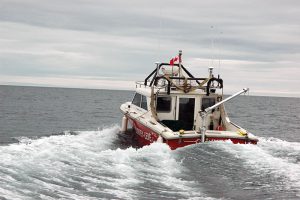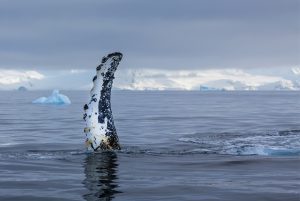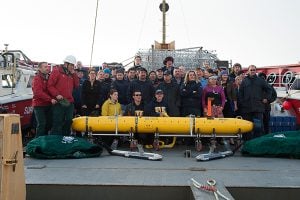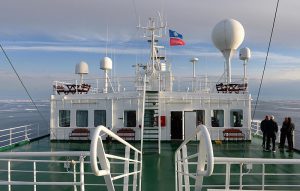
History
2014 Victoria Strait Expedition
This year's search is about much more than underwater archaeology. The Victoria Strait Expedition will contribute to northern science and communities.
- 1205 words
- 5 minutes
This article is over 5 years old and may contain outdated information.
History

Imagine this scene: a small flotilla of Canadian research ships, an icebreaker and a navy vessel have converged over a speck of Arctic Ocean floor in Victoria Strait, northwest of Nunavut’s King William Island. The ships — viewed from the observation deck of Vancouver-based One Ocean Expedition’s research-outfitted cruise ship Voyager — are a flurry of wet-suited Parks Canada divers and other researchers, members of the Canadian Coast Guard and other 2014 Victoria Strait Expedition players. A sonar scan has picked up what looks like a shipwreck.
What I don’t know yet, in this imagined scenario, is if they’ve discovered both HMS Erebus and HMS Terror, the ships from Sir John Franklin’s 1845 expedition. Finding both could finally explain the worst disaster in polar exploration history. Finding one would solve a key chunk of one of the greatest mysteries of the last few centuries, but eventually, the search for the other would continue.
The 2014 Victoria Strait Expedition brings together, under the Expedition Flag of The Royal Canadian Geographical Society, the largest hunt for the ships since Britain realized Franklin was missing. Supported and accompanied by The W. Garfield Weston Foundation, the Arctic Research Foundation and Shell Canada, the RCGS’s floating headquarters will be the polar-seasoned Voyager.
This year also marks the first time that a few members of the public have the chance to join scientists and researchers, historians and Arctic expedition experts in the North. One Ocean, with the RCGS, has made a limited number of the Voyager’s berths available to donors. “This is the most historically important thing we’ve ever done,” says Andrew Prossin, expedition leader and Managing Director of One Ocean. “We’ve never before been able to perform such major scientific work while on a passenger voyage. We’re actually housing the Explorer, the expedition’s new underwater autonomous vehicle [an unmanned, programmable submarine]. Passengers will be one deck up, in the lounge and bar, looking down on the launching, operation and retrieving of this state-of-the-art scientific search equipment.”
Arctic exploration has never sounded so comfortable. For more information about becoming a passenger on the voyage that could make Arctic history, click here.
From late August to September 9, I will be aboard the Voyager sending out expedition updates for the RCGS and Canadian Geographic magazine. And it’s a good year to be in the thick of the annual search mission. Theories about the Erebus and Terror’s whereabouts abound, of course, based on ice floe patterns, Inuit testimony and the crew’s Victory Point cairn note describing how the ships became locked in Victoria Strait ice and were abandoned. It’s the latter piece of evidence that brings experts to this area for the first time: the last location of the vessels, as reported by their crews, seems a logical place to look.
Much has been gained through the concerted effort to track down the Franklin Expedition — just not the ships themselves. Besides turning up historically precious artifacts and human remains, the modern searches have helped establish the Canadian government’s presence across the North while charting immense new sections of Arctic Ocean floor.
The question isn’t “Will they find anything?” It’s “What will they find?”
For more information, updates and other Franklin content, follow @Cangeo and @RCGS_SGRC on Twitter.
Are you passionate about Canadian geography?
You can support Canadian Geographic in 3 ways:

History
This year's search is about much more than underwater archaeology. The Victoria Strait Expedition will contribute to northern science and communities.

Environment
Ten years after the release of her seminal book Sea Sick, Alanna Mitchell again plumbs the depths of the latest research on the health of the world’s oceans — and comes up gasping

History
Why this summer’s search for the lost ships of the Franklin Expedition will be the biggest and most advanced ever

History
First official day of the 2014 search for Sir John Franklin’s lost ships